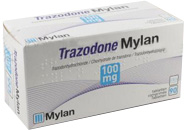Lexapro, also known by its generic name escitalopram, is an oral medication that falls under the selective serotonin reuptake inhibitor (SSRI) class of drugs. It is primarily prescribed to treat major depressive disorder and generalized anxiety disorder in adults and adolescents aged 12-17 years old. Lexapro works by restoring the balance of certain chemicals in the brain, specifically serotonin, which helps improve mood, sleep, appetite, and energy levels.
This medication comes in the form of tablets and should be taken orally with or without food. The dosage is determined by the prescribing healthcare professional based on the specific condition being treated and the patient’s individual response to the treatment. It is important to follow the prescribed dose and duration of treatment to achieve the maximum benefits of Lexapro.
Safety Measures
While Lexapro can be effective in managing depressive and anxiety disorders, there are certain situations and conditions where its use may not be suitable.
- Do not take Lexapro if you have a known allergy or hypersensitivity to escitalopram or any of its components.
- If you are currently taking or have recently taken a monoamine oxidase inhibitor (MAOI), do not start taking Lexapro, as a dangerous interaction between the two can occur.
- Inform your healthcare provider about any other medications you are taking, including prescription, over-the-counter, and herbal products, as certain drugs may interact with Lexapro.
- Lexapro should be used with caution in individuals with a history of seizures, bipolar disorder, liver or kidney problems, or a bleeding disorder.
- Pregnant and breastfeeding women should consult their healthcare provider before using Lexapro, as its safety during pregnancy and lactation has not been established.
Managing Side Effects
Like any medication, Lexapro may cause certain side effects, although not everyone experiences them. Common side effects include:
- Nausea
- Drowsiness or fatigue
- Dizziness
- Insomnia or changes in sleep patterns
- Increased sweating
If these side effects persist or worsen, it is important to inform your healthcare provider. In some cases, your healthcare provider may adjust your dosage or switch you to an alternative medication. It is also important to avoid abruptly stopping Lexapro without consulting your healthcare provider, as it may lead to withdrawal symptoms.
Administration
Lexapro should be taken exactly as prescribed by your healthcare provider. Typically, the recommended starting dose for adults is 10mg daily, which can be adjusted based on individual response and tolerability.
If you miss a dose, take it as soon as you remember. However, if it is close to the time for your next dose, skip the missed dose and continue with your regular dosing schedule. Do not double the dose to make up for a missed one.
In the event of an overdose, seek immediate medical attention or contact your local poison control center. Symptoms of overdose may include nausea, vomiting, rapid heartbeat, dizziness, and seizures.
Understanding Drug Interactions
Lexapro can interact with certain medications, which may alter its effectiveness or increase the risk of side effects. It is important to inform your healthcare provider about all the medications you are taking, including prescription, over-the-counter, and herbal products. The following are some medications that may interact with Lexapro:
| Medication | Interaction |
|---|---|
| Monoamine Oxidase Inhibitors (MAOIs) | Do not take Lexapro if currently taking or recently taken MAOIs, as a dangerous interaction can occur. |
| Nonsteroidal Anti-Inflammatory Drugs (NSAIDs) | Increased risk of bleeding may occur when combined with Lexapro. |
| Anticoagulants (e.g., warfarin) | Lexapro may increase the risk of bleeding when taken with anticoagulants. |
Questions and Answers for Lexapro
-
Can Lexapro be used to treat children and adolescents?
Lexapro is approved for the treatment of major depressive disorder in adolescents aged 12-17 years old. However, it is not approved for use in children below the age of 12.
-
How long does it take for Lexapro to start working?
The full therapeutic effects of Lexapro may not be seen immediately. It may take several weeks of continuous use before significant improvements in symptoms are observed.
-
Can Lexapro cause weight gain?
Weight changes, including weight gain or weight loss, have been reported as side effects of Lexapro. However, individual response may vary, and not everyone experiences weight changes.
-
Can Lexapro be used during pregnancy?
The safety of Lexapro during pregnancy has not been established. It is important to consult your healthcare provider if you are pregnant or planning to become pregnant while using Lexapro.
-
Can alcohol be consumed while taking Lexapro?
It is generally recommended to avoid or limit alcohol consumption while taking Lexapro, as it may increase the risk of certain side effects such as drowsiness and dizziness.






Reviews
There are no reviews yet.